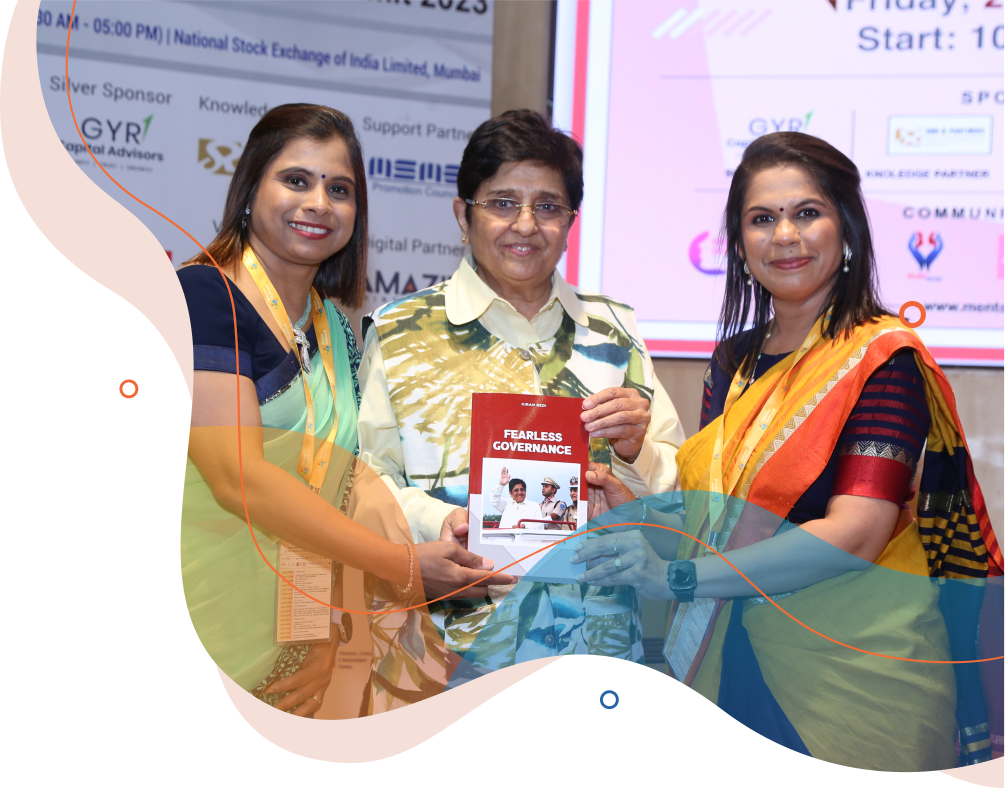Networking
We build a strong network for our board members and directors who have recognized themselves as "board-ready" by providing certain skill sets, board details, and other important information. We also help to build qualified "Board members" to mentor "Board ready" members.
Know moreEvents
MMB conducts special events for board members and directors that will help you manage your board roles better and help you grow your businesses faster with the right board structures in place which are primarily scheduled weekly or monthly with affordable rates.
Know moreMentoring
The first step to moving forward would be self-assessment and knowing where your capabilities belong. Once that happens, the next step would be the desire to learn by mentoring under industry experts, impact subject matters, and exceptional mentors. We bring our experienced mentors to your assistance in a group or a one-to-one format.
Know moreAssistance
MMB directs towards different robust government practices, compliances, and insights that make the board competitive with various tools, advisory guidance and consulting through industry experts on the platform.
Know moreSERVICES
Perfection to give satisfaction.
For directors, we provide them healthy transition, whether it's helping them to create a network of like-minded directors, assist in their board processes, elevate their leadership experience, grooming their board roles, or get access to eminent Board Mentors, we offer state of art platform and Board services and board assistance to ensure the greatest value for you
VIDEO GALLERY
Dig into our recent Video gallery
Explore some of our special events and courses conducted by experts.

MENTORING
Transforming your mind and broadening your vision.
MMB helps to transform directors and board members to run their organization smoothly with effective skillsets and learning. With this, they can see higher engagement, more positivity, an inclusive workplace, and better leadership qualities. Directors who have access to MMB courses, see more promotion, skill development, increased confidence, and better personal and professional outcome.
Our special skillset include-
- Leadership Skills
- Decision-making skills
- Presentation skills
- Financial Literacy skill
- Negotiation skills
- Goal-setting skills
SUITABLE FOR
Directors and Aspiring Directors
With directors and board members, corporates can also benefit from MMB courses that will empower senior management executives and C-Suit employees and organizations to improve through the proven benefits from mentoring.
Business owners / Entrepreneurs
Startup Directors
Promoter Directors
Foreign Directors
Business leaders
Professionals
UPCOMING EVENTS
Exclusive Events, Lifetime Learning.
MMB events give an effective learning experience to directors and board members for you to experience different aspects of mentoring. Here are some upcoming events that would benefit you.
* Become a mentor on MentorMyBoard.ASSISTANCE
Building the future with effective assistance.
With different courses, we also provide you with different types of assistance, right from finance, liability insurance to Self-evaluation and governance, we make your experience smooth with us.
- Compliance Assitance
- Finance Assistance
- Insurance Assistance
- Document wallet
- Self- evaluation
- Board evaluation
- Board Advisory
- Board Opportunity
Online courses for various board roles
Learn various board skills at your convenient time
Sharpen your board skills with exclusively curated board courses
Grow in your business and board journey with enhanced learning and awareness
COURSES
Learning made it interesting for you.
MMB offers effective mentoring programs to see higher results with the organization that will help you to develop the goal and skills through different courses which included one on one mentoring, other learning activities, group mentoring, etc.
NETWORKING
Connect with your space.
MMB will help you grow your network from fixing facetime meetings, accessing different board opportunities to a long-lasting relationship. Building your network while attending different courses can help you grow your skillset and business.
- Facetime Meetings
- Access to board meetings
- Mentoring and support
- Expert Human library
- Long-lasting relationship
- Raised profile
EVENT GALLERY
Dig into our recent Image gallery












VISION & Mision
Our Vision and Mission

Vision
To be the most preferred one-stop solutions provider for Directors and Boardrooms worldwide.

Mission
To create a platform that facilitates Directors to build on their capabilities for the Board roles, get access to a community of Directors and Board services under one roof which helps them perform their roles efficiently and effectively.
BLOGS
Check out our Latest Blogs
BECOME A PARTNER
Join us as a Partner to offer one stop solution to Board Leaders of Indian Corporate Wrold
Lets bring the difference in functioning of the Boards & build effective Board Leadership
Product Partner
Service Partner
Corporate Partner
Testimonials
Our clients are a happy lot and seek engaging experiences, and this motivates us time and again to deliver our best.
"Thank you very much for your e mail and the way this program was organised, including sending the pictures. I was also really impressed by the quote you mentioned that learning and leadership are interdependent on each other."
"Good to be part of this one day webinar rather an insightful workshop....this is most needed workshop for the directors and would be Director. Thanks to all the speakers for giving broader outlook to me. "
"Thank you Divya for two days of superlative learning! I would love to interact with MentorMyBoard in the days ahead and will explore ways of doing so in the days to come. Thank you for forwarding the presentations. They are of great help indeed! I would like to point out that the Certificate of Participation has not been attached and request that it be mailed to me. "
"Thank you Divya. It was an amazing experience to be there. Very insightful & I thoroughly enjoyed it. Looking forward to learning more with you. "
"Congratulations once again on successfully conducting the "Boardroom Mastery" certificate program. It was definitely very beneficial. Looking forward to learning more with you."
"Thank you very much for your e mail and the way this program was organised, including sending the pictures. I was also really impressed by the quote you mentioned that learning and leadership are interdependent on each other."
"Good to be part of this one day webinar rather an insightful workshop....this is most needed workshop for the directors and would be Director. Thanks to all the speakers for giving broader outlook to me. "
"Thank you Divya for two days of superlative learning! I would love to interact with MentorMyBoard in the days ahead and will explore ways of doing so in the days to come. Thank you for forwarding the presentations. They are of great help indeed! I would like to point out that the Certificate of Participation has not been attached and request that it be mailed to me. "
"Thank you Divya. It was an amazing experience to be there. Very insightful & I thoroughly enjoyed it. Looking forward to learning more with you. "
"Congratulations once again on successfully conducting the "Boardroom Mastery" certificate program. It was definitely very beneficial. Looking forward to learning more with you."
"Thank you very much for your e mail and the way this program was organised, including sending the pictures. I was also really impressed by the quote you mentioned that learning and leadership are interdependent on each other."














